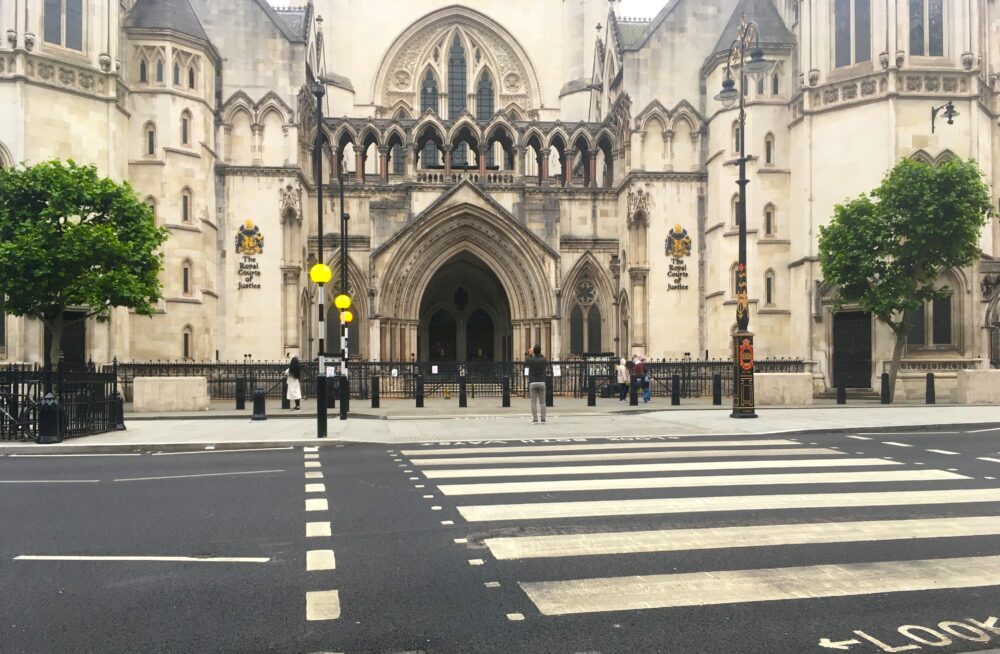The High Court judge who rejected Julian Assange’s appeal to stop his extradition to the U.S., is the U.K. government’s former top lawyer, reports Mark Curtis.
- Swift was entrusted to act for the Defence and Home Secretaries in at least nine legal cases
- His ‘favourite clients were the security and intelligence agencies’ while representing the government
By Mark Curtis
Declassified UK

Jonathan Swift, the High Court judge who has rejected Julian Assange’s appeal against extradition to the U.S., has a long history of working for the government departments that are now persecuting the WikiLeaks founder.
Swift, who ruled against Assange on June 6, was formerly the government’s favourite barrister.
He worked as ‘First Treasury Counsel’ – the government’s top lawyer – from 2006 to 2014, a position in which he advised and represented the government in major litigation.
Swift acted for the Defence and Home Secretaries in at least nine cases, Declassified has found. He also acted for the Cabinet Office, Justice Secretary and the Treasury, during his time as First Treasury Counsel.
Swift also represented the Foreign Office in at least two legal cases, in 2011 and 2015.
While barristers are independent, those who regularly represent the government in the highest profile cases have to be “cleared” to do so, including via security vetting, Declassified understands.
When he stepped down as First Treasury Counsel in March 2014, the attorney general’s office “expressed their appreciation for Jonathan’s valuable support, advice and advocacy during his period as FTC.”
It was reported in 2013 that Swift had been paid nearly a million pounds – £975,075 – over the previous three years for representing the government.
Swift now presides over Assange’s extradition case being fought by the Home Office for whom he previously worked.
As with previous judges who have ruled against Assange, the case raises serious concerns about institutional conflicts of interests at the heart of the U.K. legal system.
‘Favourite Clients’

MI6 building, left, Vauxhall Bridge over the River Thames, London. St. George Wharf on right. (shando. CC BY-SA 2.0, Wikimedia Commons)
Swift was appointed a deputy high court judge in 2016 and a full judge in August 2018. A June 2018 interview with Swift in a legal publication noted that his “favourite clients were the security and intelligence agencies” referring to his time as First Treasury Counsel.
“They take preparation and evidence-gathering seriously: a real commitment to getting things right,” he was quoted as saying.
The interview also mentioned Swift was undertaking work for “foreign governments” although Declassified has not been able to establish which governments these were.
Swift took up his current post of judge in charge of the Administrative Court in 2020. A long standing QC with prominent law firm 11KBW, he was in 2018 also a legal adviser to a committee of the City of London Corporation.
In June last year, Swift ruled that a deportation flight to Rwanda could go ahead, refusing to accept arguments to stop the flight by several asylum seekers facing offshoring to Rwanda.
National Security Cases
Several cases in which Swift acted for the government while First Treasury Counsel concerned national security, on which the judge is now expected to adopt an impartial approach.
Swift represented the Treasury in the first case before the new Supreme Court in 2009, concerning international sanctions against terrorists.
In 2014 he acted for the defence secretary in a case against three former interpreters for U.K. forces in Afghanistan who won the right to bring their case to the High Court for alleged discrimination. The interpreters argued they were in danger and should be allowed to settle in Britain.
In an earlier case, in 2007, Swift also represented the U.K. Ministry of Defence in a case against a U.K./Iraqi national who had been held by British troops at detention facilities in Iraq. The man argued his detention infringed his rights under the European Convention on Human Rights.
“Several cases in which Swift acted for the government while First Treasury Counsel concerned national security on which the judge is now expected to adopt an impartial approach.”
Much of the WikiLeaks disclosures for which the U.S. seeks to prosecute Assange relate to Western military conduct in Iraq and Afghanistan.
Another of Swift’s cases as First Treasury Counsel concerned disclosure of information to the public. He acted for the attorney general in a long-running freedom of information case brought by The Guardian seeking to release the private correspondence between Prince Charles and government ministers.
In February 2014, Attorney General Dominic Grieve blocked the publication of the letters, overruling an independent freedom of information tribunal that had ordered their release.
Swift, acting for Grieve, told the court that the minister “was entitled to take a different view on matters of public interest from the tribunal”.
Ruling
In his rejection of the appeal by Assange’s lawyers, Swift curtly dismissed all eight grounds to their arguments as “no more than an attempt to re-run the extensive arguments made to and rejected by the District Judge”, who previously ruled on the case.
Media freedom group Reporters Sans Frontieres said Swift’s ruling brought Assange “dangerously close to extradition”.
It added it was “absurd that a single judge can issue a three-page decision that could land Julian Assange in prison for the rest of his life and permanently impact the climate for journalism around the world.”
The U.S. government seeks to extradite Assange in order to try him in connection with WikiLeaks’ publication of leaked classified documents that informed public interest reporting around the world.
Assange faces a possible 175 years in prison and would be the first publisher prosecuted under the U.S. Espionage Act.
Mark Curtis is the editor of Declassified U.K., and the author of five books and many articles on U.K. foreign policy.
This article is from Declassified UK.
Support CN’s Spring
Fund Drive Today




he may have been provided with a bench memorandum by a govt lawyer to read out as his own judgement. A BM is usually prepared by a law graduate and is now the main method by which cases in the HC and above are determined. Saves reading all that boring paperwork old boy. Leaves time to concentrate on tax avoidance.
BRITISH “JUSTICE” ~ WHAT A FARCE.
When the U.K. government goes judge shopping they sure know how to score a bargain!
The UK government has the US disease of money power controlling all branches of government via political parties. This cannot be ended without abolishing all mass media and political expenditures except via registered entities limited to registered individual donations limited to perhaps the average day’s pay in any year. All opposition to that is treason: making war upon democracy with money, or for clarity call it subversion, and all violations should be grave felonies.
It’s time for the Scales of Justice on the Old Bailey to be taken down, and replaced by a statue of Lady Justice with her head bowed in shame.
It seems there is no more justice to be had in the UK anymore.
Jonathan Swift—-oh how sad that he uses the name of that wonderful writer the real Jonathan Swift . That man had both a heart, a brain and a soul. I suppose that this current Jonathan Swift who is currently alive, would think that the REAL writer Jonathan’s Swifts, “A Modest Proposal,” would be a great way to treat the poor in Britain——yes, he would no doubt approve of the eating of the children.
How horrible that this imposter uses the name of, ” Jonathan Swift. “
I swear. It is time the citizenry formed a labor union. And when one of these ethics free jerks fail to live up to the simple code of pure decency, yet pretend pompously they are authentic, the union would refuse all services to them and their families. Plumbing, construction, ambulance, cleaners, housekeepers, mechanics, baby sitters, shoe shiners, gardeners, chimney swifts, rat removers, firemen, police, ….So focused they appear to be on maintaining their seat in the Fraternity of More Important People, that a basic sense of mutual decency, earned respect, fairness, and a true understanding of how law is meant to work seems demonstrably beyond their ken.
“Rat removers” made me laugh Selina. These people are worse than rats. But that’s a bloody good idea of yours.
In an episode of the UK situation comedy, “Yes, Prime Minister” the question arose of how to pressure a judge to give the decision that the government wanted.
The senior civil servant was outraged at such a suggestion. And said that you cannot see to do such an abhorrent thing.
He was then asked what could be done instead.
“Well, you pick a judge who doesn’t need any pressure.”
You have to wonder if this incredible baseness and subservience to power is an Anglo-Saxon thing. Not exclusively, of course, but England and its spawn certainly seem to wallow in it. In any case, you know them by their works.
The dishonorable “sir” Jonathan Swift joins the dishonorable Emma Arbuthnot (of war-profiteering fame) and the dishonorable opportunist Marianna Ny (a disgrace of Sweden). They are the servants of the main war criminals and war profiteers.
From the article:
“It was reported in 2013 that Swift had been paid nearly a million pounds – £975,075 – over the previous three years for representing the government.”
“Swift now presides over Assange’s extradition case being fought by the Home Office for whom he previously worked.”
“The interview also mentioned Swift was undertaking work for “foreign governments” although Declassified has not been able to establish which governments these were.”
Say no more. I wonder what his renumeration is in this case. (And from whom it will come.)
No surprises that the gulf between The law and justice is so wide and so perverse.
Law is what one can afford and justice is usually denied to those who can’t pay.
The UK system, also, awards those in legal system who have shown subservience to the law as akin to a business transaction by elevating them to the bench.
It’s no consolation that the two national leaders who could’ve ended this travesty of justice, Boris Johnson and Trump, now find themselves embroiled in their own breaches of the law.
I eagerly await charges to be brought against Sir Keir Starmer who, as shown by Nils Melzer, did his darnedest to ensure that the Swedish government continue to pursue Julian longer than warranted.
The willingness of those in the UK legal system to brown-nosed successive POTUS is a damning indictment on British justice.
Surely Sir Jonathan Swift’s namesake would be recoiling in his grave.
Today, Australia’s federal parliament voted to conduct a referendum seeking to enshrine an indigenous voice into the constitution – a major landmark in Australian human rights; something that Albanese is puffing his chest about.
PM Albanese now needs to summon some courage, a sense of justice, determination and resolve to get Julian out of the tortuous UK legal system and ensure that he doesn’t end up in the clutches of Biden’s DOJ.
No matter where you live:
a.albanese.mp[at]@aph.gov.au